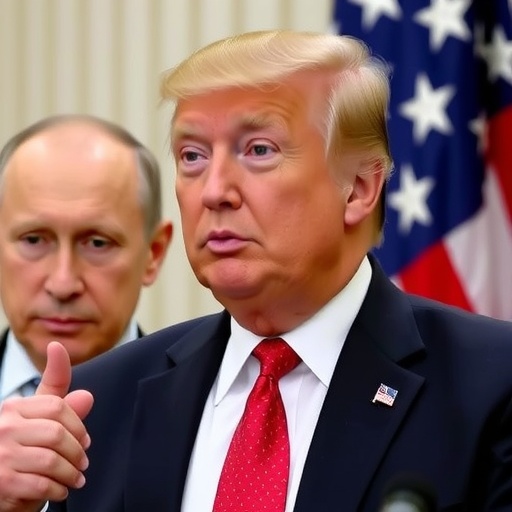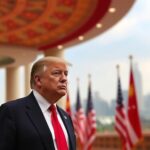Trump Rejects Putin Meeting Until Ukraine Peace Deal: New Sanctions Slam Russian Oil Giants
In a bold diplomatic pivot that has sent shockwaves through international relations, President Donald Trump has declared he will not sit down with Russian President Vladimir Putin until a concrete peace deal ends the grinding war in Ukraine. This announcement, delivered during a fiery White House press briefing on Tuesday, underscores the escalating tensions between the U.S. and Russia, as stalled negotiations leave the conflict’s future hanging in precarious balance. With the planned summit in Budapest now indefinitely postponed, Trump also unveiled a fresh wave of U.S. sanctions targeting key Russian oil companies, aiming to squeeze Moscow’s war machine economically.
The decision marks a significant departure from Trump’s earlier overtures toward dialogue with Putin, highlighting the administration’s growing frustration with what it calls ‘unproductive talks.’ As Ukrainian forces hold the line against Russian advances, this move could reshape the geopolitical landscape, forcing both leaders to confront the human and economic toll of the prolonged conflict.
Trump’s Unyielding Demand for Ukraine Resolution
President Trump’s announcement came amid mounting pressure from allies and domestic critics alike to take a harder line on Russia’s invasion of Ukraine, now in its third year. Speaking to reporters, Trump emphasized that any meeting with Putin would be ‘pointless’ without tangible progress toward a peace deal. ‘We’re not going to waste time shaking hands while bombs fall on innocent Ukrainians,’ Trump stated, his voice laced with the trademark intensity that has defined his foreign policy approach.
This stance is rooted in the administration’s assessment that previous diplomatic efforts have yielded little beyond rhetoric. U.S. officials, speaking on condition of anonymity, revealed that internal briefings highlighted Russia’s intransigence in ceasefire discussions, particularly on territorial concessions. The war, which erupted in February 2022, has claimed over 500,000 lives according to United Nations estimates, displacing millions and devastating Ukraine’s infrastructure.
Trump’s position also reflects broader strategic calculations. By linking a potential summit to a peace deal, the U.S. aims to leverage its influence to push for negotiations that include robust security guarantees for Ukraine, such as NATO membership pathways or demilitarized zones along the border. Experts note that this could pressure Putin, whose economy is already strained by existing Western sanctions, into concessions he has long resisted.
Historical context adds layers to Trump’s decision. During his first term, Trump and Putin maintained a complex rapport, marked by summits in Helsinki and Singapore. However, the Ukraine crisis has tested that dynamic, with Trump now aligning more closely with European partners like Germany and France, who have called for unified action. A recent poll by Pew Research Center shows 68% of Americans support stronger measures against Russia, bolstering Trump’s resolve.
Budapest Summit Scrapped: Echoes of Diplomatic Deadlock
The postponement of the highly anticipated Budapest summit, originally slated for next month, represents a tangible casualty of the diplomatic impasse. Hosted under the auspices of the Organization for Security and Co-operation in Europe (OSCE), the meeting was envisioned as a neutral ground for Trump and Putin to address not just Ukraine but also broader issues like arms control and cyber threats.
Hungarian officials confirmed the delay late Monday, citing ‘scheduling conflicts’ but sources close to the negotiations point to deeper rifts. Budapest, with its history of Cold War-era diplomacy, was chosen for its symbolic neutrality, yet the venue now symbolizes stalled progress. ‘This isn’t just about calendars; it’s about commitment,’ said a European diplomat involved in preparatory talks.
The summit’s collapse underscores the fragility of multilateral efforts to broker peace in Ukraine. Previous rounds in Istanbul and Geneva have faltered over disagreements on Russia’s demand for recognition of annexed territories like Crimea and parts of Donbas. Ukrainian President Volodymyr Zelenskyy welcomed Trump’s announcement, tweeting, ‘America’s leadership is crucial. No deals with aggressors without justice for Ukraine.’
Behind the scenes, intelligence reports suggest Russian delegations were preparing counterproposals that included economic incentives for Ukraine, but these were deemed insufficient by Washington. The delay could extend for months, potentially until after key U.S. midterm elections, allowing Trump to frame his foreign policy as resolute amid domestic political battles.
New Sanctions Bite into Russian Oil Empire
In tandem with the summit postponement, the Trump administration rolled out a sweeping package of sanctions targeting Russia’s vital oil sector, home to giants like Rosneft and Gazprom Neft. These measures, detailed in an executive order signed Tuesday, prohibit U.S. firms from engaging in transactions with these entities and freeze related assets, aiming to curb the estimated $100 billion in annual oil revenues funding Moscow’s military.
The sanctions build on previous rounds but introduce novel elements, such as secondary penalties on third-country buyers who evade restrictions. ‘We’re closing every loophole that lets Putin profit from pain,’ Treasury Secretary Janet Yellen remarked during a Capitol Hill hearing. Economic analysts project these could shave 5-7% off Russia’s GDP growth this year, exacerbating inflation rates already hovering at 8%.
Russia’s response was swift and defiant. Kremlin spokesman Dmitry Peskov labeled the moves ‘economic terrorism,’ vowing retaliatory tariffs on U.S. agricultural exports. Oil prices spiked 3% on global markets following the news, with Brent crude reaching $85 per barrel, raising concerns for American consumers at the pump.
The impact on Ukraine is twofold: While sanctions weaken Russia’s war chest, they also risk global energy disruptions. Ukraine, heavily reliant on Western aid, has seen its own economy contract by 30% since the invasion, per World Bank data. Aid packages from the U.S., totaling $75 billion to date, now include provisions for energy diversification away from Russian supplies.
- Key Targets: Rosneft, responsible for 40% of Russia’s oil exports.
- Exemptions: Limited allowances for humanitarian oil flows to avoid starving allied nations.
- Enforcement: Enhanced monitoring via satellite tracking of tankers.
Industry insiders warn that while effective in the long term, these sanctions may drive Russia toward deeper ties with China and India, complicating global efforts to isolate Putin.
International Allies Rally Behind Trump’s Ukraine Push
Trump’s declaration has elicited a spectrum of reactions from global leaders, with NATO allies largely endorsing the tough posture while neutral powers express caution. British Prime Minister Rishi Sunak praised the move as ‘a necessary escalation,’ pledging additional £2 billion in military aid to Ukraine. In contrast, Turkish President Recep Tayyip Erdogan, a key mediator in Black Sea grain deals, urged ‘restraint to prevent further escalation.’
Within Europe, the response is unified yet nuanced. German Chancellor Olaf Scholz, whose country has weaned off Russian gas through LNG imports, stated, ‘Sanctions must be multilateral to maximize impact.’ France’s Emmanuel Macron echoed this, proposing an emergency EU summit to align on secondary sanctions.
Further afield, China’s foreign ministry called for ‘dialogue over confrontation,’ reflecting Beijing’s balancing act as it maintains strong trade links with Russia. Indian officials, major buyers of discounted Russian oil, have remained silent, but analysts predict subtle shifts in purchasing patterns to dodge U.S. penalties.
Domestic voices in the U.S. are divided. Senate Majority Leader Chuck Schumer hailed the sanctions as ‘long overdue,’ while some Republicans, like Senator Rand Paul, criticized them as risking ‘unintended economic blowback.’ Public opinion, per a Gallup survey, tilts toward support, with 62% favoring stricter measures on Russia.
Humanitarian organizations, including the Red Cross, highlighted the war’s toll: Over 10 million Ukrainians displaced, with winter approaching and energy shortages looming. Trump’s strategy, they argue, must prioritize civilian protections in any peace deal.
Pathways to Peace: Challenges and Prospects Ahead
Looking forward, Trump’s linkage of a Putin meeting to a Ukraine peace deal sets the stage for intensified diplomatic maneuvering. U.S. envoys are already shuttling to Kyiv and Warsaw to coordinate with Ukrainian and Polish counterparts on negotiation red lines, including the return of occupied territories and war crimes accountability.
Prospects for a breakthrough hinge on several factors. Russia’s military, bogged down in attritional warfare, faces manpower shortages with desertion rates climbing, according to British intelligence. Meanwhile, Ukraine’s counteroffensives, bolstered by Western-supplied HIMARS systems, have reclaimed swaths of territory, shifting the momentum.
Yet challenges abound. Putin’s domestic narrative frames the war as existential, making concessions politically risky. A potential peace deal might involve phased withdrawals, monitored by UN peacekeepers, but trust deficits run deep. Economic pressures from sanctions could tip the scales; Russia’s central bank has burned through $300 billion in reserves since 2022.
For the U.S., success means bolstering NATO’s eastern flank while avoiding direct involvement. Trump has hinted at incentives for Russia, like eased sanctions post-deal, but only if Putin commits to verifiable steps. As winter sets in, with Ukraine bracing for blackouts, the urgency for resolution intensifies.
Analysts foresee a protracted stalemate unless external mediators, perhaps from the Vatican or Brazil, intervene. Ultimately, this diplomatic gambit by Trump could either forge a lasting Ukraine peace deal or entrench divisions, with the world watching closely for the next move in this high-stakes chess game.
In the coming weeks, expect ramped-up U.S. diplomatic outreach and potential G7 coordination on sanctions enforcement. The path to peace remains arduous, but Trump’s firm stance signals a renewed commitment to ending the suffering in Ukraine on terms that honor sovereignty and justice.








